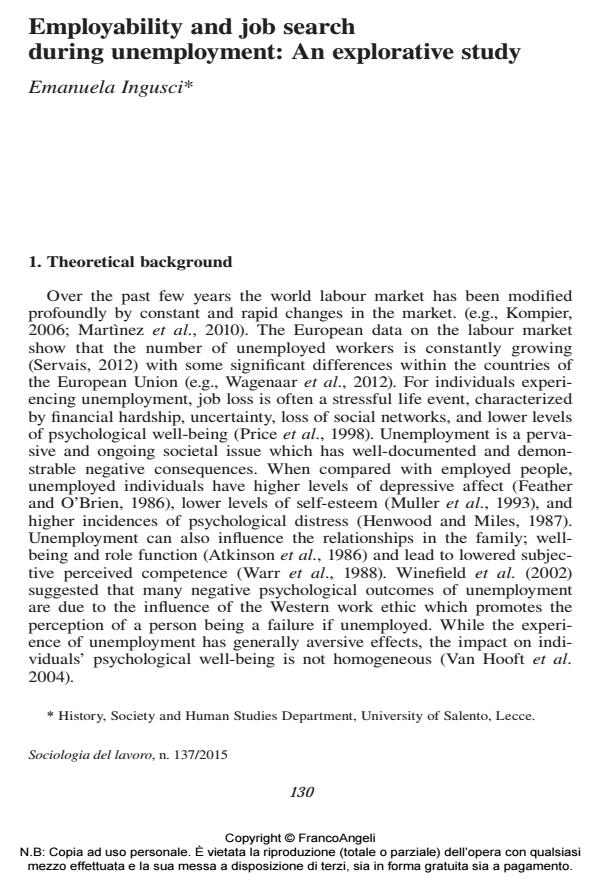Employability and job search during unemployment: An explorative study
Titolo Rivista SOCIOLOGIA DEL LAVORO
Autori/Curatori Emanuela Ingusci
Anno di pubblicazione 2015 Fascicolo 2015/137
Lingua Inglese Numero pagine 15 P. 130-144 Dimensione file 135 KB
DOI 10.3280/SL2015-137008
Il DOI è il codice a barre della proprietà intellettuale: per saperne di più
clicca qui
Qui sotto puoi vedere in anteprima la prima pagina di questo articolo.
Se questo articolo ti interessa, lo puoi acquistare (e scaricare in formato pdf) seguendo le facili indicazioni per acquistare il download credit. Acquista Download Credits per scaricare questo Articolo in formato PDF

FrancoAngeli è membro della Publishers International Linking Association, Inc (PILA)associazione indipendente e non profit per facilitare (attraverso i servizi tecnologici implementati da CrossRef.org) l’accesso degli studiosi ai contenuti digitali nelle pubblicazioni professionali e scientifiche
Employability is defined as a psycho-social construct comprised of three dimensions: adaptability, career identity and human and social capital. Some scholars deal with employability from a person-centered perspective, independently from one’s employment status. It means that one can be employable without necessarily being in employment. The psycho-social model has been applied in helping individuals to cope with unemployment as it can be used to assist them to recognize that their employability can be self-improved, despite the temporary absence of employment. Starting from this perspective, the aim of this paper is to explore the employability in a cluster of unemployed workers. Employability was found out to be positively related to job search behavior.
L’occupabilità è definita come un costrutto psico-sociale che comprende tre dimensioni: adattabilità, identità di carriera e capitale umano e sociale. Alcuni studiosi considerano l’occupabilità come un concetto centrato sulla persona ed indipendente dallo status occupazionale. A tale proposito è stato sviluppato un modello psico-sociale finalizzato a supportare gli individui ad affrontare la disoccupazione: tale modello prende in esame diverse variabili come antecedenti dell’occupabilità e variabili come la qualità del reimpiego. L’obiettivo di questo articolo è di esplorare l’occupabilità di un campione di lavoratori disoccupati, considerando le attività sviluppate per agevolare la ricerca di un impiego. I risultati evidenziano una relazione positiva tra occupabilità e comportamenti di ricerca del lavoro. Sono discusse, inoltre, le limitazioni dello studio e le prospettive future di ricerca.
Parole chiave:Occupabilità, comportamenti di ricerca del lavoro, disoccupazione
Emanuela Ingusci, Employability and job search during unemployment: An explorative study in "SOCIOLOGIA DEL LAVORO " 137/2015, pp 130-144, DOI: 10.3280/SL2015-137008